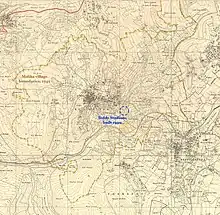Teddy Stadium
Teddy Stadium (Hebrew: אצטדיון טדי) is a sports stadium in Jerusalem. Three Israeli football teams currently use it as their home ground: Beitar Jerusalem, Hapoel Jerusalem, and the Israel national football team for select home matches.
 | |
| Location | Jerusalem, Israel |
|---|---|
| Public transit | |
| Owner | Jerusalem Municipality |
| Operator | Ariel Municipal Company Ltd. |
| Capacity | 31,733[1] |
| Field size | 105 m × 68 m (344 ft × 223 ft) |
| Surface | Grass |
| Scoreboard | LED |
| Construction | |
| Broke ground | 1990 |
| Opened | 1991 |
| Renovated | 1997–1998, 2011–2013, 2018–2020 |
| Construction cost | $ 60 million |
| Architect | Yossi Ben Naim Pascual Broid |
| Tenants | |
| Beitar Jerusalem (1991–present) Hapoel Jerusalem (1991–present) Israel national football team (selected matches)
| |
The stadium is named after long-time Jerusalem mayor Teddy Kollek, who was in office during the time of its construction and was one of its prominent advocates.
History
.jpg.webp)
The stadium was built in 1990-91 as part of a wider redevelopment project by the Jerusalem Municipality focused on the suburb of Malha, which until then had been a poor area populated by immigrants families who had replaced the village's Palestinian population in 1948.[6] The redevelopment of the area subsequently included the Malha Mall (built 1993) and the Jerusalem Technology Park (built 1996).[6]
For Beitar, the stadium was a major upgrade after years of playing at the YMCA Stadium, nicknamed "The Sandbox". In the first stage, only the west and east sides of the stadium were built, giving it a capacity of 14,500. In 1999, work was finished on a north side which contains capacity of 8000 seats.
The stadium itself is one of the newest in Israel and one of the few that are close to meeting all European standards. It is accessible to the disabled, has modern bathrooms, and has ample concession stands, a combination that is very difficult to find in many Israeli stadiums. The stadium has 5,000 parking spots on its premises, and is connected to the Malha Mall and its parking facilities by a pedestrian bridge.
The stadium is located at the Begin Expressway and just past the Malha Train Station, which ensures convenient road and rail access to the rest of Israel.
With stands close to the pitch and excellent acoustics, Teddy Stadium has hosted several Israel national football team matches, the Maccabiah Games opening ceremony, and other public events.
A south side stand was completed on June 3, 2013, increasing seating capacity to 31,733.
Teddy Stadium was one of the venues for the 2013 UEFA European Under-21 Football Championship and hosted the tournament's final match.
The first official match of the Israel national football team in the new stadium was played on March 31, 2015. Israel hosted the Belgium national football team in the UEFA Euro 2016 qualifying match and lost the match by a score of 0–1.
Israel was chosen to host The 2021 IFAF Flag Football World Championship which were played at Teddy Stadium after feared high winds at the original venue, The Kraft Family Sports Campus in Jerusalem.
Supporters
During Beitar matches, the La Familia group occupies the eastern sections of the stadium. They are known for being the most vocal and controversial of fans in the venue.[7][8]
Renovations
In September 2016 a new solar system which can produce 639 kW was installed on the roof of the stadium.[9]
In mid-2018 Jerusalem municipality announced a 25 million ₪ upgrade of the stadium which have finished at the start of 2019:
- The players warm-up hall was renovated.
- New ergonomic players seats were installed.
- New professional sound system was installed on the roof.
The second phase of the renovation began in February 2019, and was completed in August 2020:[10]
- Completion of the new roof for the south stand.
- Extension of the solar system on the new south stand roof.
- Installation of a new external LED lights show system around the stadium.
- Built new 8 VIP boxes in the west stand.
The third phase of the renovation began in 2021, and these are the things which have been completed so far until the end of 2022/23 season:[11]
- Replacement of 6700 remaining old seats in the north stand with new modern seats.
- Extension of the new sound system on the south stand roof.
- Replacement of the old stadium lighting with new dynamic LED lights system.
- Replacing the old screens by installing two new LED screens on the roofs of the north and south stands.
Jerusalem municipality allocated dozen of millions ₪ more for further improvements towards 2023/24 season:[12]
- Construction of new shops and restaurants outside the north stand.
- Dressing rooms and players tunnel renovation.
- Construction of a new VIP complex.
International matches
| Date | Result | Competition | Attendance | ||
|---|---|---|---|---|---|
| 12 February 1992 | 1–2 | Friendly | 2,000 | ||
| 29 November 1994 | 4–3 | Friendly | 4,000 | ||
| 20 September 1995 | 3–1 | Friendly | 8,000 | ||
| 22 January 1997 | 1–1 | Friendly | 500 | ||
| 15 April 1998 | 2–1 | Friendly | 14,000 | ||
| 24 February 1999 | 2–0 | Friendly | 6,000 | ||
| 9 February 2003 | 3–3 | Friendly | 4,000 | ||
| 14 November 2012 | 1–2 | Friendly | 8,000 | ||
| 31 March 2015 | 0–1 | UEFA Euro 2016 qualifying | 29,750 | ||
| 13 October 2015 | 1–2 | UEFA Euro 2016 qualifying | 25,300 | ||
| 9 October 2016 | 2–1 | 2018 FIFA World Cup qualification | 9,000 | ||
| 9 October 2017 | 0–1 | 2018 FIFA World Cup qualification | 28,700 | ||
| 16 November 2019 | 1–2 | UEFA Euro 2020 qualifying | 16,700 | ||
| 19 June 2023 | 2–1 | UEFA Euro 2024 qualifying | 13,300 | ||
Gallery
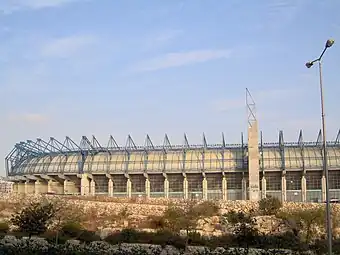 2006
2006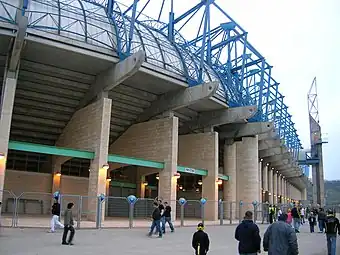 2007
2007 2007
2007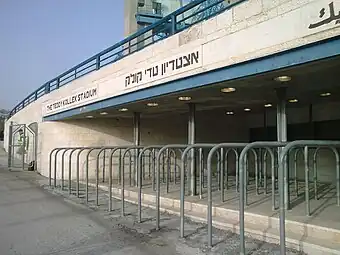 2011
2011.JPG.webp) 2013
2013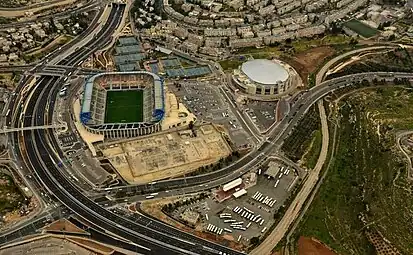 2015
2015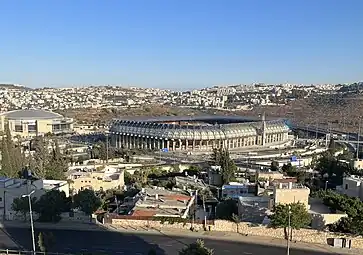 2022
2022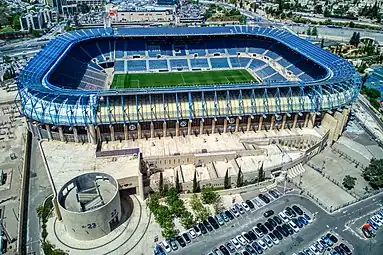 2023
2023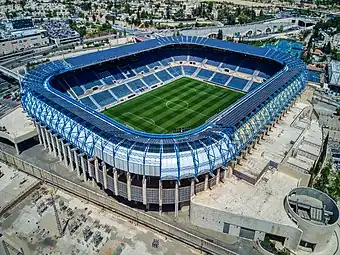 2023
2023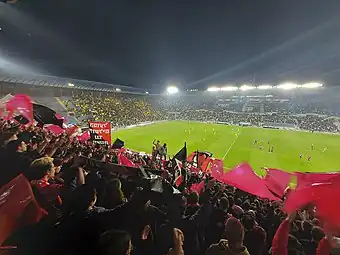 2023
2023
See also
References
- "Beitar Jerusalem Official Website".
- Satellite Images Show How Israel Changed Over 40 Years, Haaretz, Sep. 15, 2013: "Alongside it, the hills have filled up with new neighborhoods such as Ramat Beit Hakerem, Ramat Sharett and the new section of Malha... In the 1970 photograph, Kiryat Yovel is Jerusalem’s frontier. Beyond it are only wadis and ancient terraces. In the new photograph, that area has become one of the thriving parts of the city — the green quarter at the lower right-hand corner is Teddy Stadium, with the Malha Mall opposite, and the Jerusalem Biblical Zoo down the road."
- Arab MK welcomes cancellation of Argentina soccer game, Jun 6, 2018; Arutz Sheva, ""I congratulate the Argentine team on its decision to cancel the game at Al-Maliha Stadium," tweeted Zahalka, referencing the name the Arabs use to call the Teddy Stadium, where the game was to have been played."
- Beitar cancels Barcelona match after demand to not have game in Jerusalem, July 15, 2021; Jerusalem Post: "Palestinian Football Association president Jibril Rajoub received a letter from Laport about the match planned in Jerusalem on August 4 “in a stadium built on the ruins of the Palestinian village of al-Malha, whose residents were forcibly expelled and displaced in refugee camps,” Wafa reported."
- Argentina cancel friendly in Israel amid protests, officials say, ESPN, 2018: "The game had been a subject of controversy as it was set to be played in the Jerusalem neighborhood of Malha, which is situated on the site of a former Palestinian village destroyed during the war that established Israel 70 years ago."
- Ehrig, S.; Jung, B.C.; Schaffer, G. (2022). Exploring the Transnational Neighbourhood: Perspectives on Community-Building, Identity and Belonging. Book collections on Project MUSE. Leuven University Press. p. 167. ISBN 978-94-6270-348-3. Retrieved 15 June 2023.
A small Arab village in the 19th century, Malha was occupied by Israeli forces during the 1948 War. Houses there remained empty until 1951, when new Jewish immigrants from Kurdistan, Tunisia and Morocco arrived and moved into the area. Malha remained poor until the 1990s, when the Municipality of Jerusalem built a new neighbourhood around the old one. The new development included the biggest shopping mall in Jerusalem, a new technological compound and the construction of the Jerusalem sports stadium.
- Goldblatt, David (23 April 2008). "Football and politics in the Holy City". BBC Radio 4's Crossing Continents. Retrieved 28 August 2012.
- Heller, Aron (20 January 2012). "Israeli club paying price for racist fans". Associated Press.
- "Jerusalem: Teddy Stadium goes solar – StadiumDB.com". stadiumdb.com.
- "סופי: ביולי 2019, היציע הדרומי באצטדיון טדי ייקורה". 25 February 2019.
- "סופי: ביולי 2019, הוחלפו 6,700 כיסאות באצטדיון טדי". 5 September 2022.
- "כל הפרטים על השיפוץ שאיצטדיון טדי יעבור בקרוב". mynet Jerusalem. 18 May 2023.
